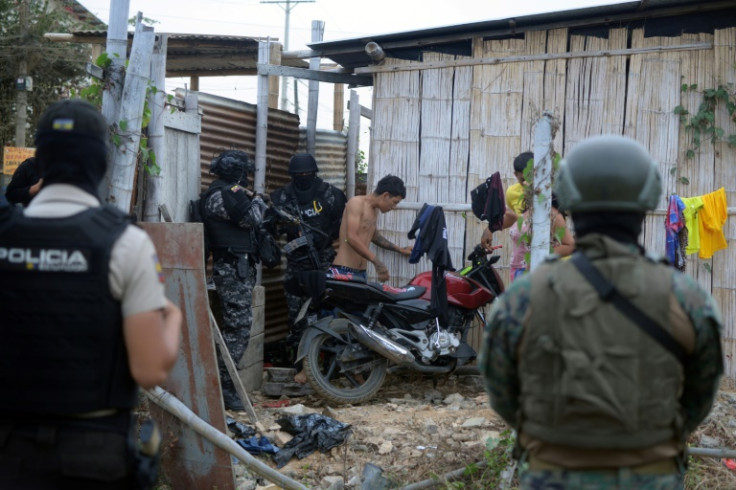
A family hauls out appliances, furniture, and even a pool table that narcos had moved into their home in southwestern Ecuador after they had abandoned it in fear, unable to pay the protection money demanded from them.
The family recently got its home back after it was recovered by security forces in the city of Duran, which is battling a form of extortion which sees drug traffickers take over parts of neighborhoods seen as strategic for their business.
"They wanted me to pay them $2,000" in exchange for supposed "surveillance" of the house, which was still under construction, the owner told AFP on condition of anonymity.
She paid the criminals $300 but it was not enough to stop the threats against her family.
"I had to leave out of fear. They kill anyone," she said.
Eight months later, she returned and found her home completed and furnished -- to the taste of the narcos.
Under the tin roof, men kick down improvised wooden partitions and throw the criminals' belongings into the street to be burned.
Duran, a small city located on the banks of the Guayas River, is prized by narcos for its access to nearby port city Guayaquil, a hub for the smuggling of cocaine to Europe and the United States.
Duran "has been subjected to the mafias for many years," Billy Navarrete, director of the Permanent Committee for the Defense of Human Rights (CDH) in Guayaquil, told AFP.
Criminal gangs use homes abandoned by families to hide out, keep hostages, or store drugs and weapons, said Cesar Pena, prosecutor of Guayas state.
In Duran, which still has many dirt roads and few public services, children are easy prey for drug traffickers looking to swell their ranks, said Navarrete.
They are forcibly recruited to act as guards, traffickers or hitmen, which causes "irreparable damage to the social fabric" of the city, he said.
"These boys and girls extort within their community. They extort those who saw them born. This didn't happen before."
In 2023, Duran was the city with the second-highest number of homicides in Ecuador, at 450. Guayaquil came first with 2,320.
The prosecutor, Pena, said extortion exploded in the country after the Covid-19 pandemic, fuelled by unemployment. He said the state of Guayas receives some 4,000 reports of extortion monthly.
Criminals target homes, businesses, schools and even human rights organizations.
The CDH has recorded threats against an activist who installed security cameras in a community center in Guayaquil.
If a homeowner "does not pay, they force him to leave the house, eliminate him, kill a family member or plant an explosive device to intimidate him," said Pena.
In a show of force, President Daniel Noboa's government deployed some 1,100 police and military personnel to Duran, warning narcos that their "hours" were "numbered."
In July, at least 100 homes were recovered in Duran. In Guayaquil, 170 houses were handed back to their owners in June.
As the family in Duran tidies up their home, a motorcycle passes by.
These "individuals are riding around on motorcycles to monitor and warn the terrorists," a policeman whispers.









